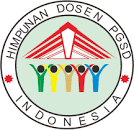Pengembangan Kurikulum Merdeka Dengan Pendekatan Deep Learning Dalam Meningkatkan Kompetensi Siswa Sekolah Dasar
Abstract
The development of science and technology creates changes in the educational aspect which causes adjustments and curriculum renewal, such as the development of an independent curriculum with a deep learning approach. This study aims to theoretically examine the development of an independent curriculum with a deep learning approach in improving the competence of elementary school students. The research method used is descriptive qualitative research with data collection techniques in the form of literature studies consisting of several stages, namely: 1) selecting the topic to be researched, 2) selecting relevant articles or books, 3) analyzing and synthesizing the literature and 4) organizing the writing. The data results show that the deep learning approach in the independent curriculum is an innovation in education that aims to increase students' understanding in depth, as well as develop critical thinking and problem solving skills. It can be concluded that the concept of an independent curriculum with a deep learning approach does not only focus on transferring information, but also emphasizes how students can connect, evaluate, and apply knowledge in real situations.
Keywords
Full Text:
PDFReferences
Alhayat, A., Mukhidin, M., Utami, T., & Yustikarini, R. (2023). The Relevance of the Project-Based Learning (PjBL) Learning Model with “Kurikulum Merdeka Belajar”. DWIJA CENDEKIA: Jurnal Riset Pedagogik, 7(1), 105. https://doi.org/10.20961/jdc.v7i1.6936 3
Al Munawar, M. A. R., Azyan, N. I., Aurelia, S., Indriani, S., & Hadiapurwa, A. (2025). Teachers’ views on optimizing Kurikulum merdeka in SMK Kencana accounting department. Hipkin Journal of Educational Research, 2(1), 93–108.
Anderson, J., & Smith, R. (2022). The Role of Deep Learning in Primary Education: Enhancing Digital Literacy. Journal of Educational Technology, 28(3), 45-58.
Arifin, A. (2025). Pendekatan Deep Learning dan Penerapannya dalam Kurikulum Merdeka. Panduan Mengajar.
Baker, L. (2023). Shaping Future Innovators: Deep Learning in Primary Schools. Journal New Horizons in Education, 17(1), 21-34.
Biggs, J., ang, C., & Kennedy, G. (2022). Teaching for quality learning at university. Fifth Edition. Maidenhead : Open University Press
Budiman, R. D. A., Mlwale, H. J., Syafruddin, S., Hamka, M., & Purnomo, S. (2024). The impact of online learning during the Covid-19 pandemic on learning outcomes. Vocational: Journal of Educational Technology, 1(1), 15–23. https://doi.org/10.58740/vocational.v1 i1.249
Fricticarani, A., Nimpagaritse, S., Fauzansyah, T. A., Rahmadani, K., & Lelfita. (2025). Designing Android-Based Smart Apps Creator Learning Media to Improve Critical Thinking Skills. Vocational: Journal of Educational Technology, 1(2), 41–53. https://doi.org/10.58740/vocational.v1 i2.300
Gufron, I. A., & Suryahadikusumah, A. R. (2024). Kajian Aksiologi Pemebelajaran Berbasis Deep learning Pada Pendidikan Dasar. Pendas: Jurnal Ilmiah Pendidikan Dasar, 9(04), 556–567.
Haqqi, A. (2017). Model Pembelajaran Dalam Upaya Meningkatkan Literasi Informasi MahasiswaJurusan Ilmu Perpustakaan dan Informasi Melalui Belajar secara Kolaboratif. Baitul Al ‘Ulum : Jurnal Ilmu Perpustakaan Dan Informasi, 1, 1–22.
Isnaeni, N. (2023). Konsep Dasar Pengembangan Kurikulum. Jurnal At-Tabayyun, 6(2), 95-103.
Khairi, A., Masri, D., Pratama, R., & Situmorang, S. E. Z. (2023). Metode Pembelajaran di dalam Q.S An-Nahl Ayat 125 Berdasarkan afsir Al-Misbah. Hibrul Ulama: Jurnal Ilmu Pendidikan dan Keislaman. 5(2), 447-48. https://doi.org/10.47662/hibrululama.v5i1.510
Kusumawati, E. (2022). Sosialisasi Kurikulum Merdeka Belajar Untuk Mewujudkan Profil Pelajar Pancasila Di Jenjang Sekolah Dasar Di Sd Al-Islam 2 Jamsaren Surakarta. BERNAS: Jurnal Pengabdian Kepada Masyarakat, 3(4), 886–893. https://doi.org/10.31949/jb.v3i4.3483
Lazuardi, D. (2017). MANAJEMEN KURIKULUM SEBAGAI PENGEMBANGAN TUJUAN PENDIDIKAN. Al-Idarah: Jurnal Kependidikan Islam, 7(1), 99–112. https://dx.doi.org/10.24042/alidarah.v 7i1.1112
Lee, H. (2022). Motivating Students Through Digital Learning: The Impact of AI and Deep Learning. Journal Educational Review, 36(2), 72-84.
Muhtaj, M., Alviansyah, D., Nailah, F., Murtiyani, T., Kurnianto, W. A., & Kurniawan, Y. (2025). Effectiveness of Big Clock Media in Teaching Analog Clock to Grade 1 Elementary School Students. Vocational: Journal of Educational Technology, 1(2), 85–92. https://doi.org/10.58740/vocational.v1 i2.356
Nofrianti, E., Prahagia, Y., Novalia, R. J., & Susanti, D. T. (2024). ANALISIS KESIAPAN GURU DALAM PELAKSANAAN KURIKULUM MERDEKA BELAJAR DI SD: STUDI DESKRIPTIF KUALITATIF. Jurnal Inovasi Dan Teknologi Informasi, 5 Nomor 1, 151–160. https://doi.org/10.52060/jipti.v5i1.190 9
Pane, A., Sembiring, E. B., Harianja, L., Yopi, M. H. F., Simanjuntak, N. S. S., & Siboro, E. S. (2025). KAJIAN TENTANG PENGEMBANGAN PROFESI GURU DALAM KOMPETENSI PEDAGOGIK MELALUI PENAMBAHAN PENDEKATAN PADA KURIKULUM MERDEKA. Jurnal Inovasi Pendidikan dan Teknologi Informasi (JIPTI), 6(1), 266-279.
Pane, A., Sembiring, E. B., Manalu, I. S. ., Lusi Harianja, Yopi, M. H. F., & Simanjuntak, N. S. (2024). Menggagas Solusi : Upaya Meningkatkan Fasilitas Sekolah untuk Pendidikan yang Lebih Baik di SD Negeri 101776 Sampali Kecamatan Percut Sei Tuan. Journal Of Social Science Research, 4(3), 9118–9130. https://doi.org/10.31004/innovative.v4 i3.11529
Patras, Y. E., Yolanita, C., Wildan, D. A., & Fajrudin, L. (2024). Pembelajaran Berbasis STEM di Sekolah Dasar Guna Meningkatkan Kemampuan Berpikir Kritis Dalam Rangka Menyongsong Pencapaian Kompetensi Siswa Abad 21. Kalam Cendekia: Jurnal Ilmiah Kependidikan, 12(2).
Putri, S. H. (2024). ANALISIS IMPLEMENTASI KURIKULUM MERDEKA DI SMA NEGERI 1 PALIPI (pp. 97–107). Cognoscere.
Robani, R., & Mustofa, T. A. (2024). Implementasi Gaya Kepemimpinan Demokratis Kepala Sekolah untuk Meningkatkan Kinerja Guru di SMA Negeri 1 Wonogiri. Ideguru: Jurnal Karya Ilmiah Guru, 9(3), 1930–1938.
Sapitri, N. K. I., Ardana, I. M., & Gunamantha, I. M. (2022). Pengembangan LKPD Berbasis Pemecahan Masalah Dengan Pendekatan 4 C Untuk Berpikir Kritis Siswa. 6(1).
Sauri, S., Gustania, R., Nugraha, C., & Zajuli, C. M. (2024). Bahasa Inggris dalam Meningkatkan Kompetensi Peserta Didik (Studi kasus di SMA Laboratorium School UPI Bandung). Jurnal Ilmiah Global Education, 5(1), 730-739.
Ulhaq, Z. S., & Rahmayanti, M. (2020). Panduan Penulisan Skripsi Literatur Review. Fakultas Kedokteran dan Ilmu Kesehatan Universitas Islam Negeri Maulana Malik Ibrahim.
Wathon, A. (2024). Kesesuaian Kurikulum merdeka dengan Kurikulum Deep learning. 4, 1280–1300.
Yassin, A., & Bashir, A. (2024). Student Satisfaction with The Use of Chat-GPT as A Learning Resource. Vocational: Journal of Educational Technology, 1(1), 1–7. https://doi.org/10.58740/vocational.v1 i1.247
DOI: https://doi.org/10.17509/jppd.v12i1.84240
Refbacks
- There are currently no refbacks.
Copyright (c) 2025 Jurnal Pedagogik Pendidikan Dasar

This work is licensed under a Creative Commons Attribution-ShareAlike 4.0 International License.
indexed By :

_page-0001-min.jpg)






.png)

